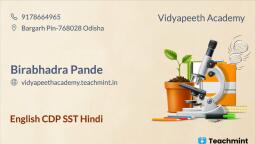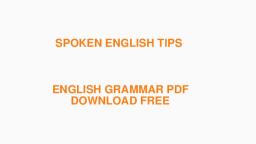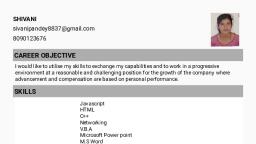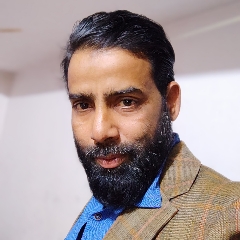Question 1 :
<b> Read the following passage carefully and answer the questions that follow by selecting the most appropriate option.</b> <br> It is your duty to train and develop your mind and acquire knowledge, as much knowledge as you possibly, can obtain. Knowledge is like a deep well, fed by perennial springs and your Mind is the little bucket that you drop into it: you will get as much as you can assimilate. The Brain, which is the physical organ of the mind, is one of the two precious products of the aeons of Evolution: the other is the imponderable “Social instinct”. This wonderful Brain, whose every convolution represents millions of years of Time, really distinguishes you from the animals. Many animals have very powerful sense organs; the eagle, the ant and the dog have keener sense of sight than Man. But no animal has a more evolved Brain and higher Intelligence. If you do not develop and use this Brain to the utmost of your power, you are more akin to the beasts than to Homo-sapiens. <br> Knowledge and mental self-culture will confer untold blessings upon you. You will not be the victim of superstition and demagogy in religion and politics. You will know your duty and do it. To be wise and independent in your religion and your politics, not to be doped and duped by the selfish priests and the scheming politicians of Capitalism and so called socialism: is this not a noble aim worth striving for? Most men and women today are not free and wise: they are like kites flown by the priests and politicians who hold the string. They are fleeced and fooled on account of their ignorance. Half the ills of man are due to ignorance. <br>If one acquires knowledge and develops mental self-culture, one will not be the victim of
Question 3 :
<b> A teacher, Amrita, uses various tasks such as creating charts, graphs, drawing, gathering information and presenting them through pair or group work. This differentiated instruction</b>
Question 4 :
<b> We use real objects to teach young learners new words because </b>
Question 5 :
<b> Read the following poem carefully and answer the questions that follow by selecting the most appropriate option.</b> <br> <br> The sun descending in the west, <br> The evening star does shine; <br> The birds are silent in their nest, <br> And I must seek for mine. <br> The moon, like a flower, <br> In heaven’s high bower, <br> With silent delight <br> Sits and smiles on the might. <br> Farewell, green fields and happy groves, <br> Where flocks have taken delight. <br> Where lambs have nibbled, silent moves <br> The feet of angles bright; <br> Unseen they pour blessing, <br> And each sleeping bosom. <br> They look in every thoughtless nest, <br> Where birds are covered warm; <br> They visit caves of every beast, <br> To keep them all from harm. <br> If they see any weeping <br> That should have been sleeping, <br> They pour sleep on their head, <br> And sit down by their bed. <br> <br>The evening star rises when <br>
Question 6 :
<b> A teacher, Amrita, uses various tasks such as creating charts, graphs, drawing, gathering information and presenting them through pair or group work. This differentiated instruction</b>
Question 8 :
<b> Read the following passage carefully and answer the questions that follow by selecting the most appropriate option.</b> <br> It is your duty to train and develop your mind and acquire knowledge, as much knowledge as you possibly, can obtain. Knowledge is like a deep well, fed by perennial springs and your Mind is the little bucket that you drop into it: you will get as much as you can assimilate. The Brain, which is the physical organ of the mind, is one of the two precious products of the aeons of Evolution: the other is the imponderable “Social instinct”. This wonderful Brain, whose every convolution represents millions of years of Time, really distinguishes you from the animals. Many animals have very powerful sense organs; the eagle, the ant and the dog have keener sense of sight than Man. But no animal has a more evolved Brain and higher Intelligence. If you do not develop and use this Brain to the utmost of your power, you are more akin to the beasts than to Homo-sapiens. <br> Knowledge and mental self-culture will confer untold blessings upon you. You will not be the victim of superstition and demagogy in religion and politics. You will know your duty and do it. To be wise and independent in your religion and your politics, not to be doped and duped by the selfish priests and the scheming politicians of Capitalism and so called socialism: is this not a noble aim worth striving for? Most men and women today are not free and wise: they are like kites flown by the priests and politicians who hold the string. They are fleeced and fooled on account of their ignorance. Half the ills of man are due to ignorance. <br>If one acquires knowledge and develops mental self-culture, one will not be the victim of
Question 9 :
<b> We use real objects to teach young learners new words because </b>
Question 11 :
<b> Read the following passage carefully and answer the questions that follow by selecting the most appropriate option.</b> <br> It is your duty to train and develop your mind and acquire knowledge, as much knowledge as you possibly, can obtain. Knowledge is like a deep well, fed by perennial springs and your Mind is the little bucket that you drop into it: you will get as much as you can assimilate. The Brain, which is the physical organ of the mind, is one of the two precious products of the aeons of Evolution: the other is the imponderable “Social instinct”. This wonderful Brain, whose every convolution represents millions of years of Time, really distinguishes you from the animals. Many animals have very powerful sense organs; the eagle, the ant and the dog have keener sense of sight than Man. But no animal has a more evolved Brain and higher Intelligence. If you do not develop and use this Brain to the utmost of your power, you are more akin to the beasts than to Homo-sapiens. <br> Knowledge and mental self-culture will confer untold blessings upon you. You will not be the victim of superstition and demagogy in religion and politics. You will know your duty and do it. To be wise and independent in your religion and your politics, not to be doped and duped by the selfish priests and the scheming politicians of Capitalism and so called socialism: is this not a noble aim worth striving for? Most men and women today are not free and wise: they are like kites flown by the priests and politicians who hold the string. They are fleeced and fooled on account of their ignorance. Half the ills of man are due to ignorance. <br>What, according to the passage, is the duty of human beings?
Question 12 :
<b> Read the following passage carefully and answer the questions that follow by selecting the most appropriate option.</b> <br> It is your duty to train and develop your mind and acquire knowledge, as much knowledge as you possibly, can obtain. Knowledge is like a deep well, fed by perennial springs and your Mind is the little bucket that you drop into it: you will get as much as you can assimilate. The Brain, which is the physical organ of the mind, is one of the two precious products of the aeons of Evolution: the other is the imponderable “Social instinct”. This wonderful Brain, whose every convolution represents millions of years of Time, really distinguishes you from the animals. Many animals have very powerful sense organs; the eagle, the ant and the dog have keener sense of sight than Man. But no animal has a more evolved Brain and higher Intelligence. If you do not develop and use this Brain to the utmost of your power, you are more akin to the beasts than to Homo-sapiens. <br> Knowledge and mental self-culture will confer untold blessings upon you. You will not be the victim of superstition and demagogy in religion and politics. You will know your duty and do it. To be wise and independent in your religion and your politics, not to be doped and duped by the selfish priests and the scheming politicians of Capitalism and so called socialism: is this not a noble aim worth striving for? Most men and women today are not free and wise: they are like kites flown by the priests and politicians who hold the string. They are fleeced and fooled on account of their ignorance. Half the ills of man are due to ignorance. <br>What, according to the passage, is the duty of human beings?
Question 13 :
<b> Read the following passage carefully and answer the questions that follow by selecting the most appropriate option.</b> <br> <br> Every evening, some part of the British Commonwealth hears the chimes of Big Ben, largest of the bells in the clock tower of the Palace of Westminster. The bell is popularly called Big Ben, and it is this bell which chimes out the quarter hours to the people of London. For Britons at sea or living in distant lands, the sound of Big Ben is still a link with home, for the chimes are broadcast each evening by the British Broadcasting Corporation. <br> Big Ben has been chiming out the quarter hours now for more than one-and-a-half centuries. It started chiming on June 11, 1859. At that time, the Parliament couldn't decide what to name the bell. A light-hearted Member of Parliament called attention, in a speech, to the impressive bulk of Sir Benjamin Hall, Queen Victoria's Chief Lord of the Woods and Forests. <br> “Call it Big Ben,” said the speaker, and the name stuck. <br> Big Ben is 9 feet in diameter, 7 feet 6 inches tall, and the thickness where the hammer strikes in 8.75 inches. <br> The clock that regulates the chiming of Big Ben keeps good time. In 1939, the Royal Astronomer made a 290-day check on the performance of the clock. He found that during this test, the margin of error was less than two-tenth of a second in 24 hours on 93 days and greater than one second only on 16 of the 290 days. <br> There was an unexpected lapse on August 12, 1945, and consternation swept through the Ministry of Works. On that dark day, the clock was five minutes slow. A flock of starlings had roosted on the minute hand. <br> <br>On August 12, 1945, Big Ben's clock was <br>
Question 14 :
Essays or long writing tasks especially on a discursive issue should
Question 16 :
<b> Read the following passage carefully and answer the questions </b> <br> <b>that follow by selecting the most appropriate option.</b> <br> Heights of Abraham are cliffs. These are one of the outstanding natural features of the city of Quebec in Canada and were the scene of a famous battle. Major General James Wolfe (1727-59) was only thirty-two years old when commanded by the British Prime minister, William Pit, to capture Quebec from the french during the seven year war (1756-63). The capture of the city lying on the banks of the St. Lawrence river in Eastern Canada, would open the way for the overthrow of the French forces in North America. For three months in the summer of 1759, Wolfe attempted to overcome the French by frontal attack from across the river, but the defenders held an almost impregnable position. Wolfe decided to make an attack from the rear in the early, dark hours of September 13. He held his army across the river above the town and surprised the French soldiers guarding the small cove which now bears his name. Then came the highly dangerous task of scaling the cliffs - the Heights of Abraham. By sunrise Wolfe and his army of 4000 had achieved their goal and were on the Plains of Abraham drawn up in battle array and ready to fight. <br> Before Wolfe's audacious plan had been carried to its successful conclusion, both Wolfe and the great French Commander, Montcalm, lay dying in the battlefield. Knowing that success was his, Wolfe whispered, I die contented.' On the other hand, when told that he was fatally wounded, Montcalm cried out. `Thank God! I shall not live to see the surrender of Quebec.' <br>Capturing Quebec would
Question 17 :
Essays or long writing tasks especially on a discursive issue should
Question 18 :
<b> Read the following poem carefully and answer the questions that follow by selecting the most appropriate option.</b> <br> <br> The sun descending in the west, <br> The evening star does shine; <br> The birds are silent in their nest, <br> And I must seek for mine. <br> The moon, like a flower, <br> In heaven’s high bower, <br> With silent delight <br> Sits and smiles on the might. <br> Farewell, green fields and happy groves, <br> Where flocks have taken delight. <br> Where lambs have nibbled, silent moves <br> The feet of angles bright; <br> Unseen they pour blessing, <br> And each sleeping bosom. <br> They look in every thoughtless nest, <br> Where birds are covered warm; <br> They visit caves of every beast, <br> To keep them all from harm. <br> If they see any weeping <br> That should have been sleeping, <br> They pour sleep on their head, <br> And sit down by their bed. <br> <br>The evening star rises when <br>
Question 19 :
<b> Read the following passage carefully and answer the questions </b> <br> <b>that follow by selecting the most appropriate option.</b> <br> Heights of Abraham are cliffs. These are one of the outstanding natural features of the city of Quebec in Canada and were the scene of a famous battle. Major General James Wolfe (1727-59) was only thirty-two years old when commanded by the British Prime minister, William Pit, to capture Quebec from the french during the seven year war (1756-63). The capture of the city lying on the banks of the St. Lawrence river in Eastern Canada, would open the way for the overthrow of the French forces in North America. For three months in the summer of 1759, Wolfe attempted to overcome the French by frontal attack from across the river, but the defenders held an almost impregnable position. Wolfe decided to make an attack from the rear in the early, dark hours of September 13. He held his army across the river above the town and surprised the French soldiers guarding the small cove which now bears his name. Then came the highly dangerous task of scaling the cliffs - the Heights of Abraham. By sunrise Wolfe and his army of 4000 had achieved their goal and were on the Plains of Abraham drawn up in battle array and ready to fight. <br> Before Wolfe's audacious plan had been carried to its successful conclusion, both Wolfe and the great French Commander, Montcalm, lay dying in the battlefield. Knowing that success was his, Wolfe whispered, I die contented.' On the other hand, when told that he was fatally wounded, Montcalm cried out. `Thank God! I shall not live to see the surrender of Quebec.' <br>Capturing Quebec would
Question 20 :
<b> Read the following passage carefully and answer the questions that follow by selecting the most appropriate option.</b> <br> <br> Every evening, some part of the British Commonwealth hears the chimes of Big Ben, largest of the bells in the clock tower of the Palace of Westminster. The bell is popularly called Big Ben, and it is this bell which chimes out the quarter hours to the people of London. For Britons at sea or living in distant lands, the sound of Big Ben is still a link with home, for the chimes are broadcast each evening by the British Broadcasting Corporation. <br> Big Ben has been chiming out the quarter hours now for more than one-and-a-half centuries. It started chiming on June 11, 1859. At that time, the Parliament couldn't decide what to name the bell. A light-hearted Member of Parliament called attention, in a speech, to the impressive bulk of Sir Benjamin Hall, Queen Victoria's Chief Lord of the Woods and Forests. <br> “Call it Big Ben,” said the speaker, and the name stuck. <br> Big Ben is 9 feet in diameter, 7 feet 6 inches tall, and the thickness where the hammer strikes in 8.75 inches. <br> The clock that regulates the chiming of Big Ben keeps good time. In 1939, the Royal Astronomer made a 290-day check on the performance of the clock. He found that during this test, the margin of error was less than two-tenth of a second in 24 hours on 93 days and greater than one second only on 16 of the 290 days. <br> There was an unexpected lapse on August 12, 1945, and consternation swept through the Ministry of Works. On that dark day, the clock was five minutes slow. A flock of starlings had roosted on the minute hand. <br> <br>On August 12, 1945, Big Ben's clock was <br>
Question 22 :
<b> Read the following passage carefully and choose the most appropriate answer to the question out of the four alternatives.</b> <br> Great books do not spring from something accidental in the great men who write them. They are the effluence of their very core, the expression of the life itself of the authors. And literature cannot be said to have served its true purpose until it has been translated into the actual life of him who reads. It is the vast reservoir of true ideas and emotions. In a world deprived of literature, the broad, the noble, the generous would tend to disappear and life would be correspondingly degraded, because the wrong idea and the petty emotion would never feel the upward pull of the ideas and emotions of genius. Only by conceiving a society without literature can it be clearly realised that the function of literature is to raise the plain towards the top level of the peaks. Literature exist so that where a man has lived finely, ten thousands may afterwards live finely. it is a means of life, it concerns the living essence. <br>What is the function of literature?
Question 24 :
Whatever the child learns in his family and community, is known as
Question 25 :
Which of the following is an incorrect assumption in language teaching?
Question 26 :
<b> Read the following passage carefully and choose the most appropriate answer to the question out of the four alternatives.</b> <br> The Eiffel Tower is an iron lattice tower located at the Champ de Mars in Paris. It was named after the engineer Gustave Eiffel, whose company designed and built the tower. Erected in 1889, it was initially criticised by some of France's leading artists and intellectuals for its design, but has become both a global cultural icon of France and one of the most recognisable structures in the world. The tower is the tallest structure in Paris and the most visited monument in the world; 6.98 million people ascended it in 2011. The tower received its 250 millionth visitor in 2010. <br> The tower is 324 metres, about the same height as an 81-storey building. During its construction, the Eiffel Tower surpassed the Washington Monument to assume the title of the tallest man-made structure in the world. The tower has three levels for visitors, with restaurants on the first and second. Tickets can be purchased to ascend by stairs or lift to the first and second levels. Although there are stairs to the third and highest level, these are usually closed to the public and it is generally only accessible by lift. As a global landmark, the Eiffel Tower is featured in media including films, video games, and television shows. <br>Why is 2010 considered a significant year?
Question 27 :
<b> Read the following passage carefully and choose the most appropriate answer to the question out of the four alternatives. </b> <br> An old shepherd was playing a flute on the marshlands outside Rome. He played so sweetly that a lovely fairy came and listened to him. <br> “Will you marry me, and play to me in my castle?” she said. <br> “Yes, yes, lovely lady!” said the shepherd. <br> The fairy put a ring on his finger. At once he became a handsome young man dressed in princely robes. “But I must first go to Rome and bid farewell to my friends”, he said. <br> The fairy gave him a golden coach with twelve white horses. As he rode in State to Rome, he met the young Queen of Italy, who invited him to her palace. <br> The shepherd saw that he had won the Queen’s heart. He resolved to marry her and become the King of Italy and let the fairy go. So when he and the Queen were alone together he knelt down and took her hand, saying: <br> “Marry me, dearest and I will help you to govern Italy.” <br> But at soon as he spoke he turned into an old and rugged shepherd. <br> “What is this horrible beggar doing here?” cried the Queen. “Whip him out of the palace.” <br>When the fairy put a ring on his finger, the shepherd
Question 29 :
<b> Read the following passage carefully and answer the questions</b> <br> <b>that follow by selecting the most appropriate option.</b> <br> <br> Nammescong Creek flowed into the backs of my thighs as I fished, pausing between casts to secure my balance in the current and admire a new hatch of pale yellow mayflies lift from the stream. Over my shoulder, the sun dropped into a farmer's cornfield, the final patch of orange light on the water enough for me to spot the small, vaguely metallic object at my feet. Retrieving it, I ran my thumb over its raised lettering, rubbing away the mud and a string of algae. A name appeared, along with an expiration date. June 1984. I had discovered arrowheads here in the past, so it didn't seem misplaced to find a tool used by modem man to obtain a meal. <br> I took a moment to consider how the card had come to rest in the bed of the Nammy. I thought maybe there was a story in it. I was curious to know if the owner had lost his wallet while fishing, the whole trip ruined the second he'd inventoried his cash or dug out his license for a game warden. Over time the leather would've rotted into fish food, with the scoured plastic remaining I wondered how many miles the card might have ridden on spring floods over the past quarter of a century. For all I knew he could've been robbed, the thieves stripping out the money and tossing the billfold away later as they crossed a bridge. <br> Looking him up and phoning. I recited the card number and issuing bank. He laughed, recalling it as the first, credit account he'd ever taken out, a line of imaginary cash in those years when he had no real money. But that finally changed, he explained, after an industrial accident cost him his left eye, the payoff from the plant enabling him to retire eight years earlier than expected and move to a small hobby farm in southern Virginia. He told me a glass eye wasn't his style, so he had taken to wearing an eyepatch which his wife still hates and his grandchildren — ages three, five, and seven — have always loved, as it makes Grandpop look like a pirate. He called them his Miracle Grandbabies, born to a daughter who struggled with alcohol and drug addiction for years — her rock-bottom in 1984, a year before she cleaned up for good. <br> But in the end the man couldn't remember ever losing his wallet, either by accident or theft. He said he'd never fished the Nammy that, in fact, he'd always thought the sport a little boring, and so I came to realize there was no story here. <br> <br>By 'looking him up', the narrator
Question 30 :
<b> Read the following poem carefully and answer the questions that follow by selecting the most appropriate option.</b> <br> <br> Come to me, O ye children! <br> For I hear you at your play, <br> And the questions that perplexed me <br> Have vanished quite away. <br> Ye open the eastern windows, <br> That look towards the sun, <br> Where thoughts are singing swallows, <br> And the brooks of morning run. <br> In your hearts are the birds and the sunshine, <br> In your thoughts the brooklets flow, <br> But in mine is the wind of Autumn, <br> And the first fall of the snow. <br> Ah! What would the world be to us, <br> If the children were no more? <br> We should dread the desert behind us <br> Worse than the dark before. <br> What the leaves are to the forest, <br> With light and air for food, <br> Ere their sweet and tender juices <br> Have been hardened into wood – <br> That to the world are children; <br> Through them it feels the glow <br> Of a brighter and sunnier climate <br> That reaches the trunks below. <br> <br>Fill in the blank. <br> What the __________ are to the forest, with light and air for food.
Question 31 :
Combining of movement abilities with academics such as speaking a language is referred to as ……………
Question 32 :
<b> Read the following poem carefully and answer the questions that follow by selecting the most appropriate option.</b> <br> <br> The grass has so little to do <br> a sphere of simple green <br> with only butterflies to brood <br> and bees to entertain <br> and stir all day to pretty tunes <br> the breezes fetch along <br> and hold the sunshine in its lap <br> and bow to everything <br> and thread the dews all night like pearls <br> and make itself so fine <br> a duchess were too common for such noticing <br> and even when it dies, to pass <br> in odours so divine <br> as lowly spices gone to sleep <br> or amulets of pine <br> and then to dwell in sovereign barns <br> and dream the days away <br> the grass has so little to do <br> I wish I were the hay. <br> <br>The poet wishes to become 'hay' because <br>
Question 35 :
<b> Read the following passage carefully and choose the most appropriate answer to the question out of the four alternatives.</b> <br> By the beginning of the twentieth century, doctors knew that many diseases were caused by living microbes. They knew about immunization and vaccines. Thanks to the efforts of scientists like Jenner, Pasteur, Koch and Ehrlich Lister, it had taught them the value of antiseptics. Known chemical disinfectants, such as carbolic acid, would kill germs, but they would also injure cell tissues. How could harmful microbes be destroyed without, at the same time, injuring body tissues? <br> In 1900, to a shipping clerk—Alexander Fleming — a career in Science seemed like distant dream. Alexander was born on August 6, 1881, the youngest son of an Ayrshire, Scottish farmer. He was able to complete High School but then his family's funds ran out. At sixteen, he took a job as a shipping clerk and stayed there for four years. In 1901, Alexander came into a small legacy which enabled him to continue his education and on the advice of one of his brothers, who was a doctor, he chose to prepare for a career in medicine. <br> Alexander did unusually well in medical school along with rifle shooting, swimming, water polo and painting. After his graduation, his teacher Prof. Wright asked him to join him in bacteriological research, which he readily agreed. <br> <br>Which of the following is most nearly the same in meaning as the word 'value'?
Question 36 :
<b>Read the following passage carefully and choose the most appropriate answer to the question out of the four alternatives.</b> <br> <br> A guest speaker was addressing the faculty and the students in the college auditorium. I had joined the faculty the year before, and was already drawing attention. I was 27, full of assumptions about myself, quick with a comment on everything, and expected people to pay attention to all that I had said. <br> I listened to the talk for the first five minutes. By the seventh, I was looking around to check if others were listening. By the tenth, I had glanced at my watch three times, and yawned once. After twenty minutes I was thoroughly bored, and telling myself that it was difficult to sit through such an insipid talk. I wanted to share some of my expert comments with my neighbor. But he was completely sold out to the speaker, and looked like it was the greatest day of his life. I was disgusted. I tried to catch a word or phrase from the talk, only to convince myself that this should be his last talk ever. <br> The one-hour talk took ages to end, and before the thanks were said, I jumped to my feet with a sigh of relief. My neighbor smiled at me and said, "The talk was wonderful, wasn't it?" I retorted, "It almost killed me with kindness". <br> <br>When the speech ended, the narrator was
Question 37 :
<b> Read the following poem carefully and answer the questions that follow by </b> <br> <b>selecting the most appropriate option.</b> <br> T' was the night before Christmas, <br> And all through the kitchen, <br> My mother was cooking some delicious chicken. <br> All of the sudden, <br> the light bulb broke, <br> And my mother randomly started to choke, <br> In a flash, Superman came. <br> My brother thought his costume was lame. <br> And instead of rescuing the day, <br> He ate up my dinner, <br> And he flew away <br> Santa burnt the house with dynamite and flares, <br> I guess I was on the naughty list, next year, I'll care! <br>Superman came and
Question 38 :
<b>Read the following poem carefully and answer the questions that follow by selecting the most appropriate option.</b> <br> <br> SHE WALKS IN BEAUTY <br> She walks in beauty, like the night <br> Of cloudless climes and starry skies; <br> and all that’s best of dark and bright <br> Meet in her aspect and her eyes: <br> Thus mellow’d to that tender light <br> Which heaven to gaudy day denies. <br> One shade the more, one ray the less, <br> Had half impair’d the nameless grace <br> Which waves in every raven trees <br> Or softly lightens o’er her face; <br> Where thoughts serenely sweet express <br> How pure, how dear, their dwelling-place. <br> And on that cheek, and o’er that brow, <br> So soft, so calm, yet eloquent. <br> The smiles that win, the tints that glow, <br> But tell of days in goodness spent, <br> A mind at peace with all below, <br> A heart whose love is innocent. <br> <br>She has the perfect combination of <br>
Question 40 :
When a test item expects the learners to use tense forms, voice, connectors, prepositions and articles accurately, such an approach can be called
Question 41 :
The theory of language development which suggests that children learn appropriate sounds and words in reaction to their parents’ reinforcement is
Question 42 :
<b>Read the following passage carefully and choose the most appropriate answer to the question out of the four alternatives.</b> <br> <br> Learning is the knowledge of that which is not generally known to others, and which we can only derive at second-hand from books or other artificial sources. The knowledge of that which is before us, or about us, which appeals to our experience, passions, and pursuits, to the bosoms and businesses of men, is not learning. Learning is the knowledge of that which none but the learned know. He is the most learned man who knows the most of what is farthest removed from common life and actual observation. The learned man prides himself in the knowledge of names, and dates, not of men or things. He thinks and cares nothing about his next-door neighbours, but he is deeply read in the tribes and castes of the Hindoos and Calmuc Tartars. He can hardly find his way into the next street, though he is acquainted with the exact dimensions of Constantinople and Peking. He does not know whether his oldest acquaintance is a knave or a fool, but he can pronounce a pompous lecture on all the principal characters in history. He cannot tell whether an object is black or white, round or square, and yet he is a professed master of the optics and the rules of perspective. <br> <br>Learning is defined as
Question 44 :
<b>Read the following passage carefully and choose the most appropriate answer to the question out of the four alternatives.</b> <br> The third defect of our civilization is that it does not know what to do with its knowledge. Science has given us powers fit for the gods, yet we use them like small children. For example, we do not know how to manage our machines. Machines were made to be man’s servants; yet he has grown so dependent on them/that they are in a fair way to become his masters. Already most men spend most of their lives looking after and waiting upon machines. And the machines are very stern masters. They must be fed with coal, and given petrol to drink, and oil to wash with and they must be kept at the right temperature. And if they do not get their meals when they expect them, they grow sulky and refuse to work, or burst with rage, and blow up, and spread ruin and destruction all around them. So we have to wait upon them very attentively and do all that we can to keep them in a good temper. Already we find it difficult either to work or play without the machines, and a time may come when they rule us altogether, just as we rule animals. And this brings me to the point at which I asked, “What do we do with all the time which the machines have saved for us, and the new energy that they have given us?” On, the whole, it must be admitted, we do very little. For the most part we use our time and energy to make more and better machines; but more and better machines will only give us still more time and more energy, and what we do with them? The answer I think, is that we should try to become more civilized. For the machines themselves, and the power which machines have given us, are not civilization but aids to civilization. <br>What do we usually do with the time and energy saved for us by the machines?
Question 46 :
<b> Read the following poem carefully and answer the questions that follow by selecting the most appropriate option.</b> <br> Weavers, weaving at break of day, <br> Why do you weave a garment so say? <br> Blue as the wing of a bluebird wild, <br> We weave the robes of a new-born child. <br> Weavers, weaving at fall of night, <br> Why do you weave a garment so bright? <br> Like the plumes of a peacock, purple & green, <br> We weave the marriage-veils of a queen. <br> Weavers, weaving solemn and still, <br> What do you weave in the moonlight chill? <br> White as a feather and white as a cloud, <br> We weave a dead man’s funeral shroud. <br>Whom does the poet address in the poem?
Question 47 :
One of the main objectives of Continuous and Comprehensive Evaluations is
Question 48 :
When a teacher uses lesson in Science and Social Science to teach language, such an approach can be termed as
Question 49 :
<b>Read the following passage carefully and choose the most appropriate answer to the question out of the four alternatives.</b> <br> The Bengal Renaissance refers to a social reform movement during the nineteenth and early twentieth centuries in the region of Bengal in Undivided India during the period of British rule. The Bengal renaissance can be said to have started with Raja Ram Mohan Roy (1775-1833) and ended with Rabindranath Tagore (1861-1941) although there have been many stalwarts thereafter embodying particular aspects of the unique intellectual and creative output. Nineteenth century Bengal was a unique blend of religious and social reformers, scholars, literary giants, journalists, patriotic orators and scientists all merging to form the image of a renaissance and marked the transition from the medieval to the modern .During this period Bengal witnessed an intellectual awakening that is in some way similar to the European Renaissance during the 16th century although Europeans of that age were not confronted with the challenge and Influence of alien colonialism. This movement questioned existing orthodoxies particularly with respect to women marriage, the dowry system, the caste system and religion. One of the earliest social movements that emerged during this time was the Young Bengal movement that espoused rationalism and atheism as the common denominators of civil conduct among upper caste educated Hindus. The parallel socio- religious movement, the Brahmo Samaj developed during this time period and counted many of the leaders of the Bengal Renaissance among its followers. <br>The Bengal Renaissance gathered momentum in the19th century because
Question 50 :
<b> Read the following passage carefully and choose the most appropriate answer to the question out of the four alternatives.</b> <br> By the beginning of the twentieth century, doctors knew that many diseases were caused by living microbes. They knew about immunization and vaccines. Thanks to the efforts of scientists like Jenner, Pasteur, Koch and Ehrlich Lister, it had taught them the value of antiseptics. Known chemical disinfectants, such as carbolic acid, would kill germs, but they would also injure cell tissues. How could harmful microbes be destroyed without, at the same time, injuring body tissues? <br> In 1900, to a shipping clerk—Alexander Fleming — a career in Science seemed like distant dream. Alexander was born on August 6, 1881, the youngest son of an Ayrshire, Scottish farmer. He was able to complete High School but then his family's funds ran out. At sixteen, he took a job as a shipping clerk and stayed there for four years. In 1901, Alexander came into a small legacy which enabled him to continue his education and on the advice of one of his brothers, who was a doctor, he chose to prepare for a career in medicine. <br> Alexander did unusually well in medical school along with rifle shooting, swimming, water polo and painting. After his graduation, his teacher Prof. Wright asked him to join him in bacteriological research, which he readily agreed. <br> <br>According to the passage, what was the main problem being encountered by doctors?
Question 51 :
<b> Read the following passage carefully and choose the most appropriate answer to the question out of the four alternatives. </b> <br/>An old shepherd was playing a flute on the marshlands outside Rome. He played so sweetly that a lovely fairy came and listened to him.<br/> “Will you marry me, and play to me in my castle?” she said.<br/> “Yes, yes, lovely lady!” said the shepherd.<br/> The fairy put a ring on his finger. At once he became a handsome young man dressed in princely robes. “But I must first go to Rome and bid farewell to my friends”, he said.<br/> The fairy gave him a golden coach with twelve white horses. As he rode in State to Rome, he met the young Queen of Italy, who invited him to her palace.<br/> The shepherd saw that he had won the Queen’s heart. He resolved to marry her and become the King of Italy and let the fairy go. So when he and the Queen were alone together he knelt down and took her hand, saying:<br/> “Marry me, dearest and I will help you to govern Italy.”<br/> But at soon as he spoke he turned into an old and rugged shepherd.<br/> “What is this horrible beggar doing here?” cried the Queen. “Whip him out of the palace.”<br/>The fairy wanted to marry the shepherd because<br/>
Question 52 :
<b> Read the following passage carefully and answer the questions that follow by selecting the most appropriate option.</b> <br/>It is your duty to train and develop your mind and acquire knowledge, as much knowledge as you possibly, can obtain. Knowledge is like a deep well, fed by perennial springs and your Mind is the little bucket that you drop into it: you will get as much as you can assimilate. The Brain, which is the physical organ of the mind, is one of the two precious products of the aeons of Evolution: the other is the imponderable “Social instinct”. This wonderful Brain, whose every convolution represents millions of years of Time, really distinguishes you from the animals. Many animals have very powerful sense organs; the eagle, the ant and the dog have keener sense of sight than Man. But no animal has a more evolved Brain and higher Intelligence. If you do not develop and use this Brain to the utmost of your power, you are more akin to the beasts than to Homo-sapiens.<br/> Knowledge and mental self-culture will confer untold blessings upon you. You will not be the victim of superstition and demagogy in religion and politics. You will know your duty and do it. To be wise and independent in your religion and your politics, not to be doped and duped by the selfish priests and the scheming politicians of Capitalism and so called socialism: is this not a noble aim worth striving for? Most men and women today are not free and wise: they are like kites flown by the priests and politicians who hold the string. They are fleeced and fooled on account of their ignorance. Half the ills of man are due to ignorance.<br/>What, according to the passage, is the duty of human beings?<br/>
Question 55 :
<b> Read the following passage carefully and answer the questions </b> <br/> <b>that follow by selecting the most appropriate option.</b> <br/>Heights of Abraham are cliffs. These are one of the outstanding natural features of the city of Quebec in Canada and were the scene of a famous battle. Major General James Wolfe (1727-59) was only thirty-two years old when commanded by the British Prime minister, William Pit, to capture Quebec from the french during the seven year war (1756-63). The capture of the city lying on the banks of the St. Lawrence river in Eastern Canada, would open the way for the overthrow of the French forces in North America. For three months in the summer of 1759, Wolfe attempted to overcome the French by frontal attack from across the river, but the defenders held an almost impregnable position. Wolfe decided to make an attack from the rear in the early, dark hours of September 13. He held his army across the river above the town and surprised the French soldiers guarding the small cove which now bears his name. Then came the highly dangerous task of scaling the cliffs - the Heights of Abraham. By sunrise Wolfe and his army of 4000 had achieved their goal and were on the Plains of Abraham drawn up in battle array and ready to fight.<br/> Before Wolfe's audacious plan had been carried to its successful conclusion, both Wolfe and the great French Commander, Montcalm, lay dying in the battlefield. Knowing that success was his, Wolfe whispered, I die contented.' On the other hand, when told that he was fatally wounded, Montcalm cried out. `Thank God! I shall not live to see the surrender of Quebec.'<br/>Heights of Abraham are<br/>





























